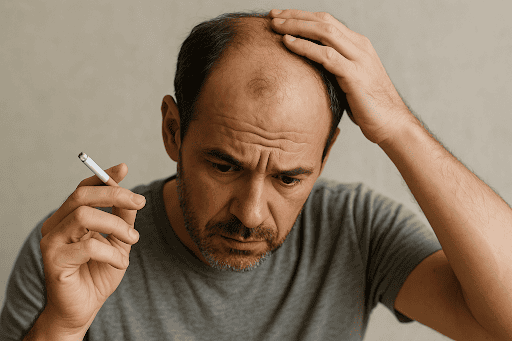Key Takeaways
- Yes, nicotine can cause or worsen hair loss by restricting blood flow to hair follicles.
- Smoking and vaping damage hair health and slow hair growth.
- Hair loss linked to nicotine may improve after quitting smoking.
- Restoring healthy hair involves nutrition, circulation, and medical treatment.
- Quitting nicotine protects both overall and hair health.
Introduction
Yes, nicotine can cause hair loss. While many associate smoking with lung or heart issues, few realize its damaging impact on hair health. Whether from cigarettes, vaping, or smokeless tobacco, nicotine restricts blood flow to hair follicles, depriving them of essential oxygen and nutrients needed for healthy hair growth.
As nicotine and other chemicals enter the bloodstream, they alter the natural hair growth cycle, potentially leading to thinning, shedding, or even premature hair loss. Understanding how this happens is essential for anyone concerned about their hair or looking to quit smoking for better overall health.
How Nicotine Affects Hair Health
1. Reduced Blood Flow to Hair Follicles
Nicotine causes blood vessels to constrict, lowering the amount of oxygen-rich blood that reaches the scalp. Over time, this can weaken hair follicles and slow their ability to produce new strands. Research shows that restricted blood flow contributes significantly to smoking-related hair loss.
2. Increased Oxidative Stress
Cigarette smoke and vaping liquids containing nicotine increase free radicals in the body. These unstable molecules damage cells, including those in hair follicles. The result is hair thinning, slower regrowth, and a weaker hair shaft prone to breakage.
3. Hormonal Disruption
Nicotine influences hormone levels, such as cortisol and dihydrotestosterone (DHT), both linked to pattern hair loss. Elevated stress hormones and DHT can cause follicles to shrink, shortening the hair growth cycle and leading to visible thinning.
Can Vaping Cause Hair Loss?
Although vaping is sometimes seen as a safer alternative to smoking, it’s not harmless. E-liquids still contain nicotine, which can affect hair similarly to cigarette use. The heat and chemicals from vapor can also contribute to inflammation in the scalp, increasing the risk of hair loss over time.
While the long-term data on vaping is still emerging, early studies suggest that vaping can cause hair loss by disrupting circulation and promoting oxidative damage—two of the same mechanisms seen with cigarette smoking.
The Role of Smoking and Tobacco in Hair Loss
Nicotine and Hair Follicle Damage
When nicotine enters the bloodstream, it triggers a cascade of effects that can damage hair follicle cells and reduce nutrient absorption. This process can contribute to hair thinning and shedding, especially in individuals with a genetic predisposition to baldness.
Tobacco Toxins and Hair Health
Cigarettes contain thousands of harmful chemicals beyond nicotine—such as carbon monoxide, tar, and heavy metals—that interfere with hair growth and may even destroy hair follicle cells over time. This destruction leads to progressive thinning, receding hairlines, and in severe cases, extensive hair loss.
Smoking-Related Hair Loss: Is It Reversible?
The good news is that hair loss caused by nicotine can be partially reversible after quitting. Once nicotine use stops, blood flow to the scalp improves, oxygen levels normalize, and inflammation decreases—creating a healthier environment for follicles.
However, recovery time depends on several factors:
- Duration and intensity of smoking or vaping
- Genetic factors related to hair growth
- Nutritional habits and stress levels
- Age and hormone balance
Some individuals may notice hair growth improvement within months of quitting, while others may require advanced hair restoration treatments or medical therapies for noticeable results.
How to Protect and Restore Hair After Quitting Nicotine
1. Support Hair Growth with Nutrition
A diet rich in antioxidants, vitamins (especially B-complex and biotin), and proteins supports healthy hair follicles. Foods like salmon, eggs, spinach, and nuts help reverse oxidative damage from smoking.
2. Promote Circulation
Exercise and scalp massage can increase blood flow to hair follicles, improving nutrient delivery and stimulating hair growth. These natural methods also reduce stress hormones that contribute to hair thinning.
3. Seek Professional Hair Restoration Options
If hair loss persists, medical interventions such as platelet-rich plasma (PRP) therapy, low-level laser therapy, or a hair transplant may be recommended. These treatments encourage new growth and strengthen existing strands.
4. Manage Stress and Hormones
Stress can worsen smoking-related hair loss, so mindfulness practices and therapy programs can help regulate cortisol levels. Consider exploring support through Virtue Recovery Chandler’s treatment programs.
Nicotine Alternatives and Smoking Cessation
Switching to non-nicotine alternatives can reduce further damage. Nicotine patches, gums, and prescription medications can help manage cravings while you work on rebuilding your health.
Virtue Recovery Chandler also recognizes the importance of smoking cessation during addiction recovery. Our medical detox programs support both substance withdrawal and behavioral change, helping individuals quit tobacco safely.
When to Seek Help
If you notice excessive hair shedding, thinning, or scalp irritation while smoking or vaping, it’s time to take action. Consult a healthcare provider or a dermatologist specializing in hair loss to assess the underlying cause.
Addressing nicotine dependence through professional addiction treatment can also support overall health restoration—including your skin, hair, and circulation. Learn more about Virtue Recovery Chandler’s holistic care approach to understand how our integrated programs promote full-body healing.
Conclusion
Yes, nicotine can cause hair loss, and the effects are both physical and biochemical. By constricting blood vessels, disrupting hormones, and increasing oxidative stress, nicotine weakens hair follicles and impairs hair growth. The same risks apply to vaping and other nicotine-containing products.
The positive news is that once you quit smoking, your scalp can begin to heal. With proper nutrition, reduced stress, and professional support, hair health can improve over time.
If you’re struggling with nicotine dependence or other addictions, professional guidance can make recovery achievable.
Call Virtue Recovery Chandler today at (866) 281-0343 to speak with a caring team member and begin your recovery journey.
Contact Virtue Recovery Chandler
FAQs
Can nicotine directly cause hair loss?
Yes. Nicotine restricts blood flow to hair follicles, depriving them of nutrients and oxygen, which can lead to thinning or loss.
Does vaping cause hair loss too?
Yes, vaping can cause hair loss due to nicotine’s similar effect on circulation and oxidative stress, even without smoke exposure.
Is nicotine-related hair loss reversible?
In many cases, hair loss improves after quitting nicotine, as blood flow and scalp health gradually recover.
Can quitting smoking restore hair growth?
Yes. Quitting allows healthy hair follicles to regenerate over time. Improvement may take several months.
What treatments can help after nicotine-related hair loss?
Treatments like PRP therapy, medication, or advanced hair restoration can encourage regrowth when paired with a nicotine-free lifestyle.







